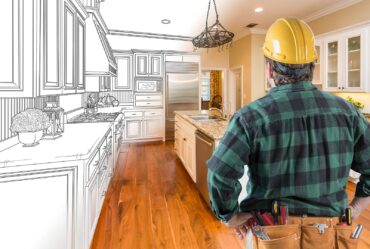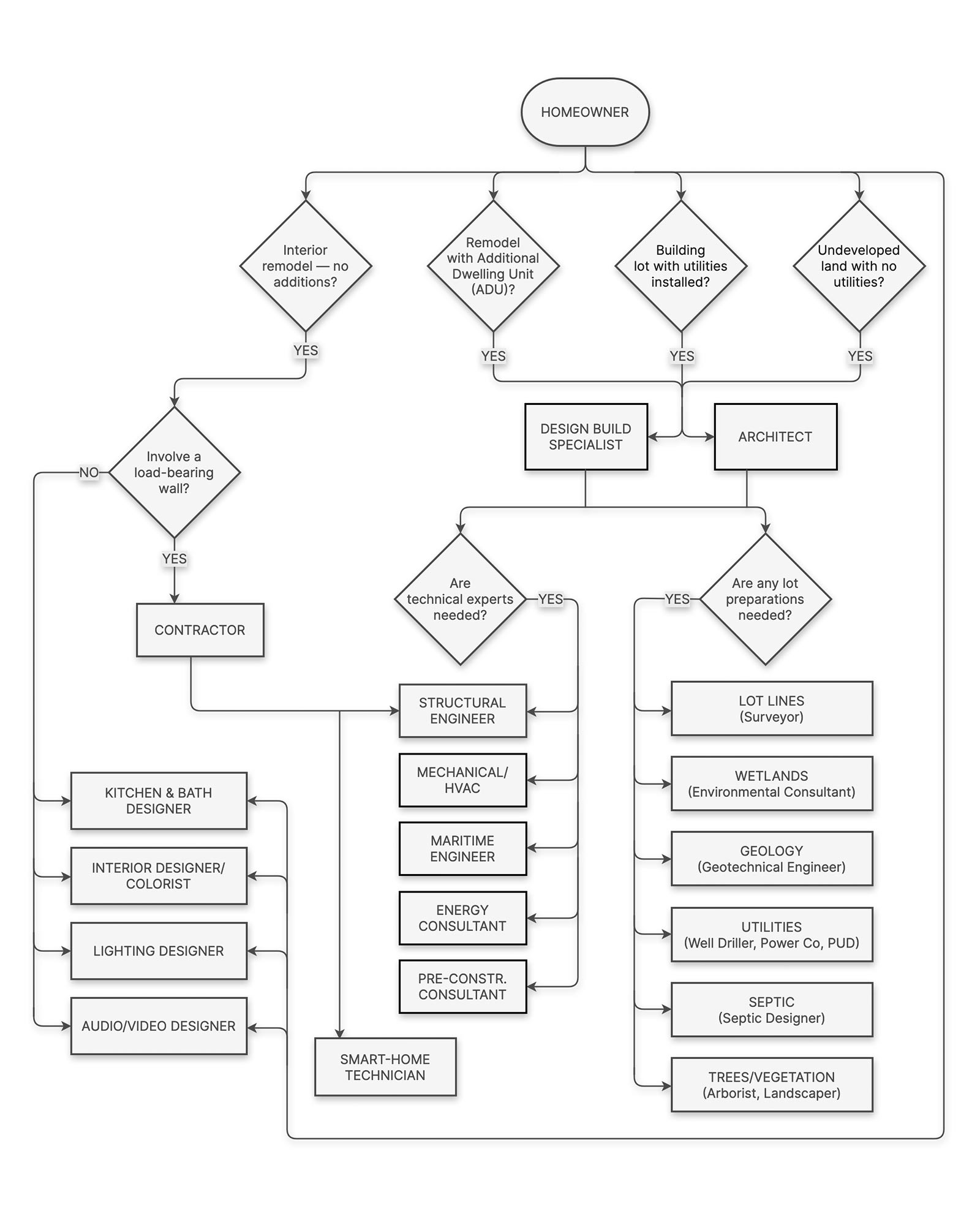 When planning to build a new home or remodel an existing one, whom do you call to start the ball rolling on making your dreams a reality? Finding the starting line for a residential building project can feel a bit illusive, so we have created a flow chart to help you navigate these potentially uncharted waters. Note that the timing on the charts pertains to hiring, not necessarily interviewing these professionals.
When planning to build a new home or remodel an existing one, whom do you call to start the ball rolling on making your dreams a reality? Finding the starting line for a residential building project can feel a bit illusive, so we have created a flow chart to help you navigate these potentially uncharted waters. Note that the timing on the charts pertains to hiring, not necessarily interviewing these professionals.
A list of the primary professionals who may be engaged for your project, along with their educational and professional qualifications, is presented below in alphabetical order. Don’t be surprised by the number and variety of professionals it may take to make your dreams come true.
Arborist
An arborist advises on the health, pruning, removal and relocation of various types of vegetation and the potential impact thereof on the property or project. The basic professional certification for an arborist is Registered Consulting Arborist. With documented work hours and certification exams, one can advance to a Certified Arborist and Certified Master Arborist, administered by the International Society of Arboriculture (ISA).
 Architect
Architect
An architect is a state-licensed professional qualified to develop a site plan and the overall schematic design and blueprints of a proposed structure, specify building materials and, in some situations, supervise construction. With contribution from many other design and build professionals, an architect takes into consideration all the constraints involved in building a structure, including jurisdictional codes, environmental impact, the geology of the building site, shoreline impact, availability and type of utilities that will be utilized, building materials that are suitable to the project location, local building codes and the clients’ aesthetic preferences and budget.
In the state of Washington, the direct path to becoming an architect is a college or university degree from an accredited architecture program, completion of an intern development program or IDP (three years of supervised work experience that is signed off by a licensed architect employer) and a state licensing exam (with all components passed). Architects who provide construction management services are required to carry liability insurance. Errors and omissions (E&O) is another form of insurance coverage recommended for architects.
Architectural Designer
Architectural designers typically work with licensed architects in creating and documenting design projects, but are not registered (licensed) with any state architecture licensing body and therefore cannot sign off on (stamp) architectural plans.
Critical Area Environmental Consultant
Environmental consultants provide a variety of services related to a specific property and adjacent properties when excavating and building a structure are being considered. These services include property mapping, code interpretation, biological assessment, habitat assessment and shoreline environmental impact assessments. The assessment often culminates in a critical area report that identifies (maps) the existence of wetlands, underground springs, animal habitats, etc., as well as defining code-required buffer boundaries.
Many properties have been “mapped” by a county or city department of development, identifying wetlands, endangered animal habitats and other components. If there are any questions as to how the buffer rules apply to a property or if the property has not been mapped, it’s in the best interest of the property owner to consult with an environmental consultant early in the planning process. Learning that a critical area report is required at the time a permit is submitted can cause delays and increase project costs.
Currently there are no required licenses or certifications for environmental consultants in Washington state. Environmental consultants hold a minimum of a bachelor’s degree in biology, botany, ecology, geology, hydrology, soil science or environmental science, and many have postgraduate degrees.
Colorist
Colorists are interior designers who specialize in color consulting and may be responsible for designing the color scheme of interior or exterior spaces. There are no licensing, certification or education requirements to be a colorist in Washington.
Design-Build Contractor
A design-build contractor is typically a general construction firm that offers designer services for construction clients. There is no legal definition of design-build and therefore, not all design-build firms have an actual designer on staff. Many simply have an established relationship with a designer. For more information on general contractors, see the definition below.
Draftsman
A draftsman is a professional who produces detailed technical plans or drawings. Draftsmen may have an educational background in art or drafting, but are not licensed by any architectural oversight organization.
General Contractor
A general contractor oversees most aspects of a construction project including, but not limited to, estimating project costs, submitting permits, scheduling building inspections, creating a project schedule, ordering materials, supervising employees and subcontractors, communicating with clients and communicating with the client’s architect or structural engineer regarding building plan questions or issues.
A general contractor must first assess the project-specific documents (architectural plans, engineering plans, septic design, etc.). In the case of renovations, a site visit is required to get a better understanding of the existing structure and property.
In Washington, there are no educational exams or certification requirements to become a general contractor. For contractors dedicated to their craft, the Building Industry Association of Washington, National Association of Home Builders and National Association of the Remodeling Industry offer continuing education and certification programs for their association members.
 To obtain a general contractor license in the state, contractors must present proof of their business license issued by the Department of Revenue, a surety bond and a certificate of liability insurance, along with their application to the Department of Licensing. Note: Hiring unlicensed general contractors or contractors with employees who are not listed on their Washington State Department of Labor & Industries (L&I) account can have serious financial ramifications for homeowners.
To obtain a general contractor license in the state, contractors must present proof of their business license issued by the Department of Revenue, a surety bond and a certificate of liability insurance, along with their application to the Department of Licensing. Note: Hiring unlicensed general contractors or contractors with employees who are not listed on their Washington State Department of Labor & Industries (L&I) account can have serious financial ramifications for homeowners.
Geotechnical Engineer
Geotechnical engineers conduct assessments of the physical, mechanical and chemical properties of soil and rock to determine if a property can be safely built on, as well as documenting prescriptions for building foundations, retaining structures and earthworks. As an example, geotechnical engineers opine on the viability (safety) of building on a slope, a bluff, uncompacted earth or fill dirt, or other unstable situations and their potential impact on the integrity of a structure.
In the state of Washington, licensed geotechnical engineers have a minimum of a bachelor’s degree in civil, geotechnical or structural engineering from an ABET-accredited college or university and four years of work-related experience. They must also pass the state licensing exam. Passage of the licensing exam is evidenced, in part, by the engineer’s ability to “stamp” building permit drawings and letters of opinion.
Interior Designer
An interior designer provides a spectrum of services starting with color consulting and interior decorating, including but not limited to, furniture and art placement; color schemes; and specification of furnishing, soft goods and window coverings for a project. Additionally, many interior designers provide detailed drawings and specifications for residential and commercial interiors. They are also responsible for assessing a client’s needs and helping clients establish realistic project budgets.
In Washington, there are no educational, certifications, exams, licenses or insurance requirements for interior designers. The American Society of Interior Designers (ASID) and the National Kitchen and Bath Association (NKBA) offer education and certification opportunities for their members who service the interior design industry.
Kitchen and Bath Designer
Kitchen and bath designers, certified by the NKBA, have technical building knowledge in framing, electrical, plumbing, HVAC and more. They have additional knowledge about the characteristics and installation requirements for cabinetry, countertops, lighting fixtures, appliances, plumbing fixtures, hardware, flooring and wall finishes. Kitchen and bath designers create design layouts and specifications, incorporating the requisite project materials in a manner that allows a general contractor to build and install the project as designed and specified.
The NKBA offers education and various certifications for their members who service the kitchen and bath industry. In Washington, there are no requirements for education, certifications, exams, licenses or insurance for kitchen and bath designers.
E&O insurance is recommended for kitchen and bath designers. Note: These professionals are also typically versed in the design and specifications for mudrooms, laundry rooms, closets, home theaters, home offices, aging-in-place requirements and more.
 Lighting Designer
Lighting Designer
Lighting designers specialize in illumination, including lighting controls. They design functional and aesthetic lighting plans to enhance the architecture and interior design of a home or a commercial space. A space can be beautifully designed, but if it’s not properly lit, it’s all for not.
Lighting designers create design layouts, incorporating the specified lighting products in a manner that allows an electrical contractor or a contractor to successfully install the fixtures according to the lighting designer’s plan.
Lighting design is a narrowly focused, technical segment of the design industry, which has experienced a tidal wave of change over the past decade with the decline of incandescent, xenon, halogen and fluorescent lighting in favor of the ever-improving LED lighting. Further, lighting design has become an integral part of smart home technology objectives.
There are no requirements for education, certifications, exams, licenses or insurance for lighting designers in the state. A lighting designer can earn various certifications, such as the Community Friendly Lighting Certification issued by the Smart Outdoor Lighting Alliance, which addresses designing for mitigation of light pollution; the Certified Lighting Consultant designation from the American Lighting Association; and the Certified Lighting Designer certification from the International Association of Lighting Designers.
Maritime Civil Engineer
Maritime civil engineers provide documented and stamped planning, design, construction and maintenance services in or around fresh and salt water. This is a highly specialized field, with similar educational, experience and licensing requirements as geotechnical and structural engineers in the state of Washington.
Septic Design Engineer
Septic design engineers analyze, design and oversee the installation of septic systems. These professionals can offer site soil assessments, hydraulics, topographic surveys and delineations. They also make recommendations for use of specialized treatment processes and devices and microbiology assessments as they relate to code-compliant construction practices.
To become licensed in Washington, septic design engineers must have a degree in civil engineering, along with experience and work-hour qualifications. They must also pass a state licensing exam; however, prior to taking the exam, they must have a high school diploma and a minimum of four years’ work experience, as approved by the licensing board, showing increased responsibility for the design of on-site wastewater treatment systems.
Specialty Contractor
There are several different types of specialty contractors who service the design and construction industry, including, but not limited to, painting, drywall, tile mason, electrical and plumbing. The Washington State Department of Licensing is responsible for issuing specialty contractor licenses with proof of a Department of Revenue business license, surety bond and certificate of liability insurance, except for plumbers and electricians.
In the interest of health and safety, electricians and plumbers have greater work experience and exam requirements than other types of specialty contractors. Becoming a licensed plumber or electrician takes time, dedication, classroom instructional hours, supervised work experience and multiple levels of examinations for licensing, depending on one’s professional goals. Exams for plumbers and electricians are administered by a third-party provider, PSI, contracted by L&I.
Structural Engineer
A structural engineer typically acts as a consultant to an architect or property owner and oversees the planning, designing, analyzing and reviewing of various physical structures, such as bridges, dams and buildings, to ensure their ability to withstand gravity and lateral forces that can impact them. Gravity loads are a type of physical pressure that the weight of the structure — including its equipment, walls, floors and other components — creates. Lateral loads are pressure exerted by external forces such as wind, explosions, earthquakes or other natural events.
Additionally, structural engineers work to ensure the integrity of each element of a structure, such as beams, foundations, columns and floors.
In the state of Washington, licensed structural engineers have a minimum of a bachelor’s degree in civil or structural engineering from an ABET-accredited college or university and four years of work-related experience; they must also pass a state licensing exam. Passage of the licensing exam is evidenced, in part, by the engineer’s ability to stamp building permit drawings and letters of opinion.
Land Surveyor
Land surveyors collect field data to create a property map or plan based on the calculations of the field parameters and measurements. The surveyor’s map establishes or verifies lot lines and specific property attributes and conditions that can guide construction and development projects prior to commencing tree removal, excavation or the building of any structure.
To become a licensed land surveyor in the state, one must have a four-year degree in surveying from an accredited college or university; complete a two-year professional training agreement with a licensed surveyor, a minimum of five projects with practical and written assessments and eight years of professional-level experience under the direct supervision of a licensed land surveyor; and pass three exams (land surveyor-in-training, principles and practices of land surveying and the state surveyor’s exam). Like licensed engineers, licensed land surveyors stamp their documents.
Smart Home Technician
A smart home technician provides architects, designers, contractors, electricians and homeowners with specifications, configuration, installation, calibrating and troubleshooting for a range of electrically connected, digital home technologies such as security systems, HVAC controls, audio-visual systems, lighting controls, window covering controls and appliances with smart home technology capabilities.
The state of Washington currently has no licensing requirements for these professionals other than a standard business license. Smart home technicians who perform installations should have a low-voltage electrical license.




























